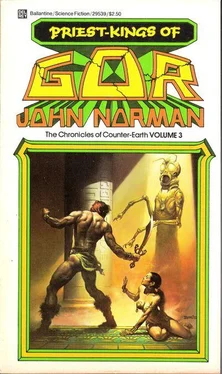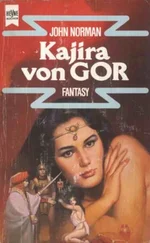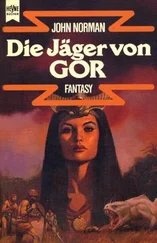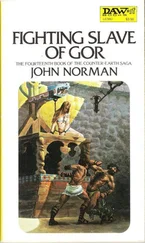I stood below him, looking up, the wind lifting and tugging my hair.
“I came to see you one last time,” he said, “for there is Nest Trust between us.”
“Yes,” I said.
“You are my friend,” he said.
My heart leaped!
“Yes,” he said, “the expression is now ours as well as yours and you and those like you have taught us its meaning.”
“I am glad,” I said.
That night Misk told me of how affairs stood in the Nest. It would be long before the powers of the broken Nest could be restored, before the Scanning Chamber could function again, before the vast damages done to the Nest could be repaired, but men and Priest-Kings were even now at work, side by side.
The ships that had sped from the Sardar had now returned, for as I had feared, they were not made welcome by the cities of Gor, nor by the Initiates, and those who had ridden the ships had not been accepted by their cities. Indeed, the ships were regarded as vehicles of a type forbidden to men by Priest-Kings and their passengers were attacked in the name of the Priest-Kings from which they had come. In the end, those humans who wished to remain on the surface had landed elsewhere, far from their native cities, and scattered themselves as vagabonds about the roads and alien cities of the planet. Others had returned to the Nest, to share in the work of its rebuilding.
The body of Sarm, I learned, had been burned in the Chamber of the Mother, according to the custom of Priest-Kings, for he had been First Born and beloved of the Mother.
Misk apparently bore him not the least ill will.
I was amazed at this, until it occurred to me that I did not either. He had been a great enemy, a great Priest-Kings, and had lived as he had thought he should. I would always remember Sarm, huge and golden, in the last agonising minute when he had pulled free of the Golden Beetle and had stood upright and splendid in the crumbling, perishing Nest that he was determined must be destroyed.
“He was the greatest of the Priest-Kings,” said Misk.
“No,” I said, “Sarm was not the greatest of the Priest-Kings.”
Misk looked at me quizzically. “The Mother,” he said, “was not a Priest-King — she was simply the Mother.”
“I know,” I said. “I did not mean the Mother.”
“Yes,” said Misk, “Kusk is perhaps the greatest of the living Priest-Kings.”
“I did no mean Kusk,” I said.
Misk looked at me in puzzlement. “I shall never understand humans,” he said.
I laughed.
I truly believe it never occurred to Misk that I meant that he himself, Misk, was the greatest of the Priest-Kings.
But I truly believe he was.
He was one of the greatest creatures I had known, brilliant, courageous, loyal, selfless, dedicated.
“What of the young male?” I asked, “Was he destroyed?”
“No,” said Misk. “He is safe.”
For some reason this pleased me. Perhaps I simply was pleased that there had not been further destruction, further loss of life.
“Have you had the humans slay the Golden Beetles?” I asked.
Misk straightened. “Of course not,” he said.
“But they will kill other Priest-Kings,” I said.
“Who am I,” asked Misk, “to decide how a Priest-King should live — or die?”
I was silent.
“I regret only,” said Misk, “that I never learned the location of the last egg, but that secret died with the Mother. Now the race of Priest-Kings itself must die.
I looked up at him. “The mother spoke to me,” I said. “She was going to tell me the location of the egg but could not.”
Suddenly Misk was frozen in the attitude of utter attention, the antennae lifted, each sensory hair alive on his golden body.
“What did you learn?” came from Misk’s translator.
“She only said,” I told him, “Go to the Wagon Peoples.”
Misk’s antennae moved thoughtfully. “Then,” he said, “it must be with the Wagon Peoples — or they must know were it is.”
“By now,” I said, “any life in the egg would surely have perished.”
Misk looked at me with disbelief. “It is an egg of Priest-Kings,” he said. Then his antennae fell disconsolately. “But it could have been destroyed,” he said.
“By this time,” I said, “it probably has been.”
“Undoubtedly,” said Misk.
“Still,” I said, “you are not sure.”
“No,” said Misk, “I am not.”
“You could send Implanted Ones to spy,” I suggested.
“There are no more Implanted Ones,” said Misk. “We have recalled them and are removing the control nets. They may return to their cities or remain in the Nest, as they please.”
“Then you are voluntarily giving up a valuable surveillance device,” I said.
“Yes,” said Misk.
“But why?” I asked.
“It is wrong to implant rational creatures,” said Misk.
“Yes,” I said, “I think that is true.”
“The Scanning Chamber,” said Misk, “will not be operational for an indefinite period — and even so we can scan only objects in the open.”
“Perhaps you could develop a depth scanner,” I suggested, “One that could penetrate walls, ground, ceilings.”
“We are working on it,” said Misk.
I laughed.
Misk’s antennae curled.
“If you should regain your power,” I asked, “what do you propose to do with it? Will you set forth the law in certain matter for men?”
“Undoubtedly,” said Misk.
I was silent.
“We must protect ourselves and those humans who live with us,” said Misk.
I looked down the hill to where the campfire gleamed in the darkness. I could see human figures huddled about it, looking up at the hill.
“What of the egg?” asked Misk.
“What of it?” I asked.
“I cannot go myself,” said Misk. “I am needed in the Nest and even so my antennae cannot stand the sun — not for more than a few hours at most — and if I so much as approached a human being it would probably fear me and try to slay me.”
“Then you will have to find a human,” I said to him.
Misk looked down at me.
“What of you, Tarl Cabot?” he asked.
I looked up at him.
“The affairs of Priest-Kings,” I said, “— are not mine.”
Misk looked about himself, and lifted his antennae toward the moons and the wind-swept grass. He looked down at the distant campfire. He shivered a bit in the cold wind.
“The moons are beautiful,” I said, “are they not?”
Misk looked back at the moons.
“Yes,” he said, “I think so.”
“Once you spoke to me,” I said, “of random elements.” I looked up at the moons. “Is that —” I asked, “— seeing that the moons are beautiful — is that a random element in man?”
“I think,” said Misk, “it is part of man.”
“You spoke once of machines,” I said.
“Howsoever I spoke,” said Misk, “words cannot diminish men or Priest-Kings — for who cares what we are — if we can act, decided, sense beauty, seek right, and have hopes for our people?”
I swallowed hard, for I knew I had hopes for my race, and I sensed how Misk must have them for his, only his race was dying, and would sooner or later, one by one, meet with accident or succumb to the Pleasures of the Golden Beetle.
And my race — it would live on Gor — at least for the time, because of what Misk and Priest-Kings had done to preserve their world for them.
“Your affairs,” I told him, but speaking to myself, “are your affairs — and not mine,”
“Of course,” agreed Misk.
If I should attempt to help Misk, what would this mean, ultimately? Would it not be to surrender my race to the mercies of the people of Sarm and the Priest-Kings who had served him, or would it be ultimately to protect my race until it had learned to live with itself, until it had reached the maturity of humanity, until it, together with the people who called themselves Priest-Kings, could address itself to a common world, and to the galaxy beyond?
Читать дальше












